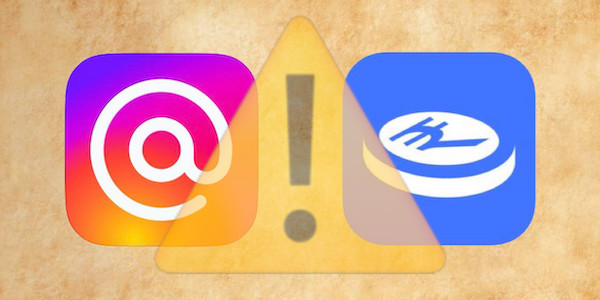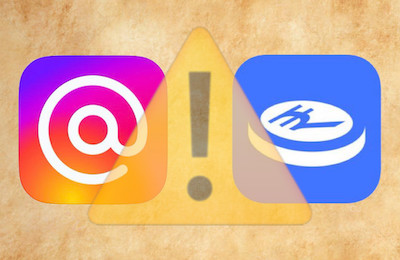[ad_1]
Posted on
by
Joshua Lengthy

After dealing with public backlash, Apple not too long ago eliminated some unethical apps from the App Retailer. Right here’s what you could know to keep away from getting scammed.
White Kash and different “predatory” lending apps
On Sunday, July 2, an Indian journalist tweeted that somebody had contacted her about an expertise somebody had with an App Retailer app in India. Apparently, somebody who had obtain an app known as “White Kash-Private Mortgage App” had granted the app entry to her contacts—a seemingly unusual request for such an app to make. Allegedly, the app’s developer then started threatening to ship faux “nude pics” of the consumer to her contact checklist.
Wtf is that this, a private mortgage app known as Kash is threatening to ship morphed nude photographs of their buyer to her total contact checklist?! pic.twitter.com/5LcsukVgef
— Sandhya Ramesh (@sandygrains) July 3, 2023
Based on the report, present App Retailer evaluations allegedly indicated that this girl wasn’t the one individual whom the app’s developer had threatened.
A TechCrunch author contacted Apple for remark the next day. Two days later—three days after the Indian journalist’s tweet—Apple had eliminated no less than six apps from the App Retailer for “falsely representing an affiliation with a monetary establishment” on July 5. Different eliminated apps’ names included Golden Kash, OK Rupee, and Pocket Kash.
“Threads for Insta” misleading social app lookalike
The next Sunday, July 9, an iOS developer tweeted about an app known as “Threads for Insta,” with the remark, “How do apps like this get previous the overview course of?” I famous that the identify and emblem had been deceptively much like Threads, an Instagram app—a brand new social media platform.
Confirmed, that is nonetheless within the App Retailer. 👀
It’s clearly meant to trick people who find themselves in search of the brand new “Threads, an Instagram app” social networking app.
cc: @privacyis1st who does a ton of analysis into rip-off/shady apps within the @Apple @AppStore. 👋 @AppleSupport https://t.co/MQJaHKJn2e
— Josh Lengthy (the JoshMeister) (@theJoshMeister) July 10, 2023
The App Retailer itemizing confirmed that “Threads for Insta” provided in-app purchases, as excessive as $79.99 per 12 months. At the very least one particular person left a overview claiming to have been deceived into pondering the app was the official Threads social networking app.
It took even longer for Apple to take away this app from the App Retailer. After a lot media consideration—and considerations over the truth that it was obtainable within the EU, the place Threads is at present unavailable—Apple lastly eliminated the app 4 days after the preliminary tweet.
Sadly, the App Retailer has steady issues
Whereas it’s good that Apple finally eliminated these apps from the App Retailer, the truth that they someway handed a guide human overview is regarding. After which, after being known as out publicly, Apple nonetheless took a number of days earlier than taking motion, in each circumstances.
Sketchy apps abound
These are removed from the primary examples of doubtless dangerous apps have appeared within the iOS App Retailer. Sketchy apps abound, notably ones that declare to supply safety or privateness advantages, and so they typically have outrageously excessive in-app buy subscriptions.
As only one instance, “Guard Browser” by an organization no person has ever heard of, “Venera OOO,” someway justifies a $3.49/week ($181.48/12 months) subscription for an app that doesn’t seem to supply extra performance than any fundamental browser—and as of late 2021, the identical app was charging $11.49/week ($597.48/12 months). Regardless of sketchy claims, poor evaluations, and ridiculous subscription pricing—for a Net browser, which might observe tons of customers’ non-public information—Apple someway permitted this app and has by no means appeared to have an issue with it.
Prior to now, malware has even entered the App Retailer
There have even been actually malware-infected apps within the iOS App Retailer previously, too. Again in 2015, 128 million customers downloaded greater than 2,500 XcodeGhost-infected apps (about two-thirds of the victims had been in China)—however Apple selected to not straight talk these details to its prospects. In 2012, Home windows malware even managed to sneak into the iOS App Retailer—only a month after a clearly faux Microsoft Phrase app was being offered within the retailer.
The Mac App Retailer isn’t a lot completely different. In 2018, we noticed a Mac-slowing, overheating, cryptocurrency mining “characteristic” get added to a calendar app, adopted by the invention of 14 apps that exfiltrated customers’ shopping historical past.
So whereas we’d prefer to say that the App Retailer is a protected haven, that’s not essentially true 100% of the time. You continue to should watch out with the App Retailer, too.
How one can keep away from getting scammed by App Retailer apps
However, the App Retailer might be nonetheless safer than downloading apps from replace aggregator websites, or different third-parties apart from the unique developer’s personal web site.
Listed here are a number of suggestions that may enable you determine App Retailer apps that you just may need to keep away from.
- Be cautious concerning the first search outcome within the App Retailer. Apple often places paid ads on the prime of search leads to the App Retailer app. Whereas the background is a barely completely different shade and there’s tiny textual content that claims “Advert,” it’s straightforward to not discover—and also you may find yourself downloading a sketchy app somewhat than the one you thought you had been getting.
- Stick with trusted corporations at any time when attainable. Attempt to keep away from downloading apps from corporations you’ve by no means heard of.
- Don’t instantly belief an app’s identify or icon. As we noticed with the Threads lookalike, sketchy apps can have very comparable names and icons to the apps you’re in all probability in search of. Examine the itemizing fastidiously to make certain it’s actually from the developer you suppose.
- Take a look at the checklist of in-app purchases. For those who see a variety of ridiculously excessive subscriptions, you could be coping with an unscrupulous developer. That’s why it’s a good suggestion to examine this, even when you’ve got in-app purchases disabled.
- Learn the App Privateness abstract. Apple informally calls this the “vitamin label.” It’s developer-reported info, so it’s attainable for a developer to lie and misrepresent their app. However for those who do occur to see almost each class checked, you may need to suppose twice, and see if you could find a extra privacy-focused different. Builders are additionally required to hyperlink to their full privateness coverage; that is imagined to result in a web page on the developer’s web site for additional info.
With these suggestions in thoughts, will probably be simpler to keep away from sketchy apps within the App Retailer.
How can I be taught extra?
 Every week on the Intego Mac Podcast, Intego’s Mac safety specialists focus on the newest Apple information, safety and privateness tales, and provide sensible recommendation on getting probably the most out of your Apple units. You should definitely comply with the podcast to ensure you don’t miss any episodes.
Every week on the Intego Mac Podcast, Intego’s Mac safety specialists focus on the newest Apple information, safety and privateness tales, and provide sensible recommendation on getting probably the most out of your Apple units. You should definitely comply with the podcast to ensure you don’t miss any episodes.
You may as well subscribe to our e-mail e-newsletter and hold a watch right here on The Mac Safety Weblog for the newest Apple safety and privateness information. And don’t neglect to comply with Intego in your favourite social media channels: ![]()
![]()
![]()
![]()
![]()
![]()
![]()
About Joshua Lengthy
Joshua Lengthy (@theJoshMeister), Intego’s Chief Safety Analyst, is a famend safety researcher, author, and public speaker. Josh has a grasp’s diploma in IT concentrating in Web Safety and has taken doctorate-level coursework in Info Safety. Apple has publicly acknowledged Josh for locating an Apple ID authentication vulnerability. Josh has carried out cybersecurity analysis for greater than 25 years, which has typically been featured by main information retailers worldwide. Search for extra of Josh’s articles at safety.thejoshmeister.com and comply with him on Twitter/X, LinkedIn, and Mastodon.
View all posts by Joshua Lengthy →
[ad_2]


